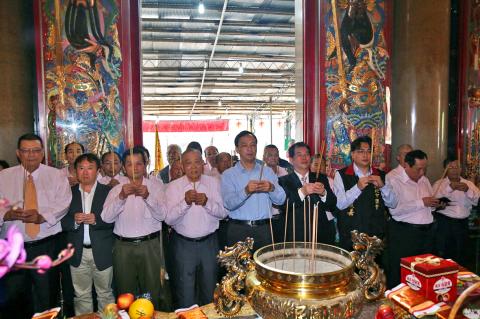Chinese Nationalist Party (KMT) legislators have initiated a petition to urge party chairman Eric Chu (朱立倫) to run for president, while Deputy Legislative Speaker Hung Hsiu-chu (洪秀柱) said the party would be “left to die” if no one comes forward soon to announce their intention to run next year.
A day after it was revealed that former interior minister Lee Hong-yuan (李鴻源) might wade into the impasse, KMT lawmakers petitioned Chu to throw down the gauntlet to the Democratic Progressive Party’s (DPP) candidate, DPP Chairperson Tsai Ing-wen (蔡英文).
At the KMT caucus meeting yesterday, KMT Legislator Wu Yu-sheng (吳育昇) was busy circulating a petition in the meeting room to collect attendees’ signatures.

Photo: Lin Yu-shan, Taipei Times
“Chu is the only person in the party who could still possibly have a close fight with Tsai; he is the only option we have. It is also possible that he could fail to win in the end, but it all depends on how well the pan-blue camp can work together as a team,” Wu said.
KMT Legislator Sun Ta-chien (孫大千) said it is “Chu’s responsibility as the party chairman, not his right, to run for president [on the KMT’s ticket].”
Wu said the petition has so far received strong support, with close to 40 legislators signing. That would amount to a majority in the KMT caucus, which has 64 legislative seats in total.
“I will not make public the list of the names of those who have signed the petition,” said Wu in response to concerns by some KMT lawmakers that the petition would divide the party.
“I don’t see the meaning of this petition, which will only split the party in two and feed the media with hubbub about KMT infighting between pro-Chu and pro-[Legislative Speaker] Wang Jin-pyng (王金平) factions,” KMT Legislator Lee Hung-chun (李鴻鈞) said. “It only puts party members in a difficult position.”
KMT Legislator Lu Chia-chen (盧嘉辰), who has always been considered pro-Wang, was said to have protested to Wu at the meeting, requesting Wu also place Wang and vice president Wu Deng-yih (吳敦義) on the petition for impartiality.
Hung said on Thursday — and reiterated yesterday — that the KMT would be “left to die” if the candidacy situation remains unresolved.
“If you are afraid of [taking action], then don’t even come out [to joint the race],” Hung said yesterday when told that potential candidates might be afraid to make their moves too early.
She called on those willing to fight to stand out or be more clear on where they stand, including the party chairman.
“If Chu really doesn’t want to run, he should also expound on his decision,” she said.
Wang continued to assert that he has no such plan “for the time being,” and said he would respect the party’s nomination process, which has not yet started.
Separately yesterday, Chu reiterated his promise to see out his term as mayor until 2019.
Chu said he had positioned himself as the “general manager” of the KMT team.
“The KMT is a team of lots of good players. Whoever is willing to participate in [the presidential election] will serve the interests of the party,” Chu said.
Additional reporting by Shih Hsiu-chuan

CHAOS: Iranians took to the streets playing celebratory music after reports of Khamenei’s death on Saturday, while mourners also gathered in Tehran yesterday Iranian Supreme Leader Ayatollah Ali Khamenei was killed in a major attack on Iran launched by Israel and the US, throwing the future of the Islamic republic into doubt and raising the risk of regional instability. Iranian state television and the state-run IRNA news agency announced the 86-year-old’s death early yesterday. US President Donald Trump said it gave Iranians their “greatest chance” to “take back” their country. The announcements came after a joint US and Israeli aerial bombardment that targeted Iranian military and governmental sites. Trump said the “heavy and pinpoint bombing” would continue through the week or as long

TRUST: The KMT said it respected the US’ timing and considerations, and hoped it would continue to honor its commitments to helping Taiwan bolster its defenses and deterrence US President Donald Trump is delaying a multibillion-dollar arms sale to Taiwan to ensure his visit to Beijing is successful, a New York Times report said. The weapons sales package has stalled in the US Department of State, the report said, citing US officials it did not identify. The White House has told agencies not to push forward ahead of Trump’s meeting with Chinese President Xi Jinping (習近平), it said. The two last month held a phone call to discuss trade and geopolitical flashpoints ahead of the summit. Xi raised the Taiwan issue and urged the US to handle arms sales to

State-run CPC Corp, Taiwan (CPC, 台灣中油) yesterday said that it had confirmed on Saturday night with its liquefied natural gas (LNG) and crude oil suppliers that shipments are proceeding as scheduled and that domestic supplies remain unaffected. The CPC yesterday announced the gasoline and diesel prices will rise by NT$0.2 and NT$0.4 per liter, respectively, starting Monday, citing Middle East tensions and blizzards in the eastern United States. CPC also iterated it has been reducing the proportion of crude oil imports from the Middle East and diversifying its supply sources in the past few years in response to geopolitical risks, expanding

Pro-democracy media tycoon Jimmy Lai’s (黎智英) fraud conviction and prison sentence were yesterday overturned by a Hong Kong court, in a surprise legal decision that comes soon after Lai was jailed for 20 years on a separate national security charge. Judges Jeremy Poon (潘兆初), Anthea Pang (彭寶琴) and Derek Pang (彭偉昌) said in the judgement that they allowed the appeal from Lai, and another defendant in the case, to proceed, as a lower court judge had “erred.” “The Court of Appeal gave them leave to appeal against their conviction, allowed their appeals, quashed the convictions and set aside the sentences,” the judges